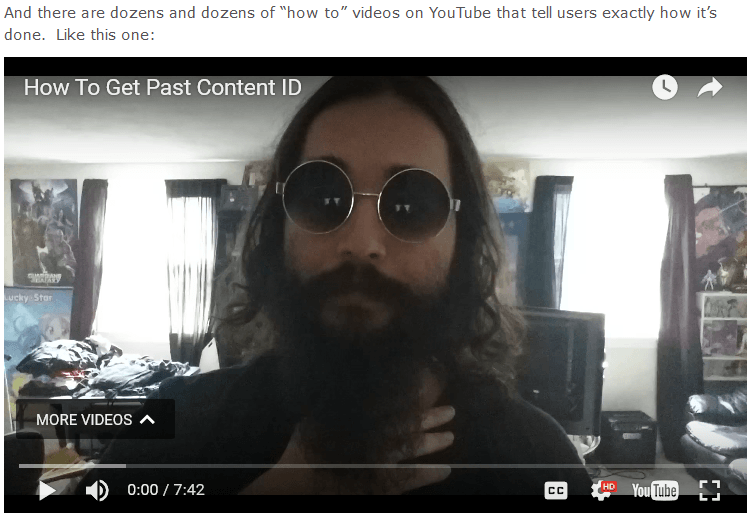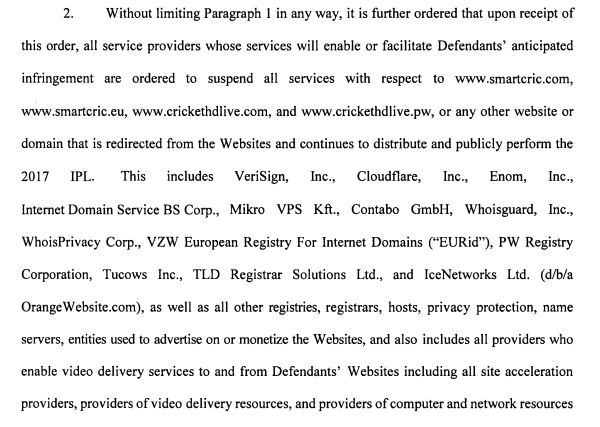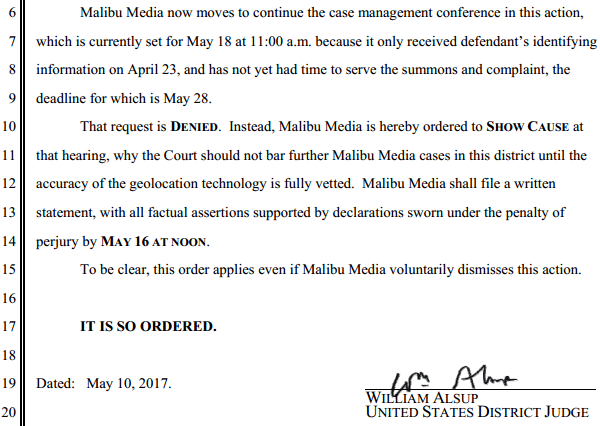YouTube Content ID Critic Doesn’t Appreciate the Irony
dimanche 14 mai 2017 à 10:56 YouTube is not only one of the best sites on the Internet today but is arguably the best multimedia platform ever created. There can be barely a person alive who has heard of the Internet but not of YouTube. The site is that important.
YouTube is not only one of the best sites on the Internet today but is arguably the best multimedia platform ever created. There can be barely a person alive who has heard of the Internet but not of YouTube. The site is that important.
But today, YouTube has problems. Despite generating hundreds of millions each year for the music industry, the major labels argue that the company fails to do enough about piracy while exploiting the safe harbor provisions of the DMCA.
YouTube sees things quite differently. The company says that its Content ID recognition system, which was developed at huge cost, allows creators to block or monetize otherwise pirated content uploaded to the platform by users.
Like every anti-piracy system ever created, Content ID is fallible. It can be circumvented using various techniques and tricks found on any number of sites and indeed, on YouTube itself. This week, that fact attracted the attention of the Music Tech Policy blog.
“What’s Wrong With Content ID? Start with Dozens of YouTube Videos on How to Defeat It,” wrote editor, industry veteran, and outspoken Google critic, Chris Castle.
Castle begins by talking a little about one of the techniques often used by people trying to evade the clutches of Content ID – changing the tempo of an uploaded music track. The idea is that by altering the speed, the fingerprint of the uploaded track is changed enough for YouTube not to recognize it as an infringing copy.
No doubt it’s a popular trick, but at this point the conspiracy theories begin.
YouTube has a feature which allows people to speed up or slow down videos, which can be handy for speed ‘reading’ an audio book, for example, or slowing down a tutorial so someone inexperienced in the task can keep up.
However, discounting fans of pitch-shifted vocals, Castle says it’s actually there for Google to make money from pirates. Slowed-down, Content ID-evading tracks can be sped back up to enjoy at normal speeds, he says.
“Why is it there? To cater to fans of Alvin and the Chipmunks? No. It’s there so YouTube can monetize illegal copies of music and movies,” he says.
“If Google were serious about piracy, they’d dump the speed control on YouTube. They’d also police the ‘how to’ defeat Content ID videos on YouTube.”
While Castle is perfectly entitled to his opinion (and it’s one that is popular in the industry) he seems oblivious to the fact that his own article not only reveals how Content ID can be gamed, but also goes on to demand that YouTube censors discussion on the same topic.
If that doesn’t already feel like a case of “don’t do as I do, do as I tell you”, then perhaps the next bit will.
Amping the irony up to 11, Castle then embeds one of the Content ID circumvention videos from YouTube into his own article.

Of course, some people will quite rightly argue that in order to properly report on the problem, someone writing on this topic might need to show an example of an ‘offending’ video on YouTube. We wouldn’t disagree with that assertion at all, 100% in agreement.
There are, however, plenty of problems. For a start, discussing how Content ID can be bypassed isn’t illegal, so if any uploaded videos covering that topic are all the creators’ own work, the resulting videos are legal too.
With that in mind, it’s difficult to see what grounds YouTube would have for taking those videos down. If nothing else, it would be seen as stifling free speech, no matter how disappointing that speech is to the music and movie industries.
Admittedly, inciting people to commit a civil wrong might be a problem in some regions, but in most cases that’s not what we’re talking about here, as illustrated by Music Tech Policy’s willingness to embed the video on its site.
The take-home here is that some material on YouTube is always going to be offensive to some people, we just have to learn how to deal with it and in some cases, make the best of it.
For example, last year I was particularly irritated to find a video on YouTube which detailed how my car could be stolen in seconds using a special device. A link to buy that device was included below the video. Screw YouTube, right? Not really.
With the information presented in the video, I was able to find and buy an aftermarket alarm/immobilizer that defeated that device and others like it.
Admittedly the video (and ‘buy’ link) had the potential to recruit other would-be car thieves to the party, but if I hadn’t have seen it too, my car would still be vulnerable today. The thieves, meanwhile, would still have the ability to steal it. As it stands, it’s going nowhere, at least by that method.
Ultimately, knowledge is power and it is absolutely pointless to try and suppress it with censorship, people are always one step ahead. We just need to use all available knowledge to our advantage.
So, despite Chris Castle perhaps not appreciating the irony, he was absolutely within his rights to write that article and embed those videos in order to illustrate a point that is not only important to him, but others too. Whether people agree with him or not is moot.
He shouldn’t be censored, and YouTube shouldn’t be required to censor people either. The site already provides Content ID to millions of satisfied users and presumably, it’s in YouTube’s best interest to have that working as advertised.
That it fails sometimes is no surprise but talking about its weaknesses, on YouTube and sites like Music Tech Policy and indeed here on TF, draws attention to the topic. And only when people are allowed to discuss stuff openly does anything get done.
Censorship is never the answer and only makes matters like these worse.
Source: TF, for the latest info on copyright, file-sharing, torrent sites and ANONYMOUS VPN services.
 Copyright holders often complain that they have virtually no means to target pirate sites, especially those run from overseas.
Copyright holders often complain that they have virtually no means to target pirate sites, especially those run from overseas.


 While relatively underreported, many U.S. district courts are still swamped with lawsuits against alleged film pirates.
While relatively underreported, many U.S. district courts are still swamped with lawsuits against alleged film pirates.